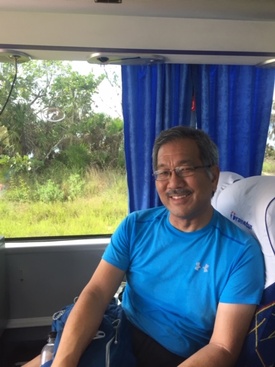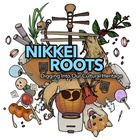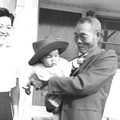I wanted to walk where my grandparents, Hikosaburo Okamura and Tsuru Uyeta, walked.
In the early 1900s, they left Japan and came to America. I did not speak Japanese. My grandparents did not speak English. I remembered no stories about their lives in Japan.
There is a Japanese song, Furusato by Angela Aki, which says:
“Home is always calling out my name.”
If I visited their Hometowns, would they call out my name?
The unprepared visitor
One month before my Japan trip, I did not know my ancestral villages. My grandparents came from Fukuoka, Japan. This is an area the size of Riverside County, California.
I contacted a genealogical group. They discovered amazing things. In 1912, my grandmother left Hatta, Japan, to marry my grandfather in Seattle, Washington. She was a “Picture Bride.” A ship passenger list included the address, “79 Teranawate, Fukuoka, Japan.”
I received notes with Google Maps. It looked simple enough. So, I planned my visit.
Excited, I got off at the Tsuiki train station. Hatta had changed in one hundred years. An air base built at the end of World War II. New homes replaced old farmhouses. Yet, I walked rural roads lined with rice and vegetable fields. The view reminded me of Selma, California, where my grandparents lived.
The next day, I got off at the Miyakoizumi train station for my grandfather’s village. I entered “79 Teranawate” into Google Maps. The little dots popped up for the walking route. I crossed the bridge to enter the village. I found a neighborhood map with family names on the wall.
What a shock to see my last name, Okamura, on the map. I was too afraid to bother them. What do I say? Google sent me! Do you trust Google that much? Besides, 100 years have passed since my grandfather was here. And what do they think about me? I look Japanese, but I do not speak Japanese.
I visited the village graveyard. Guess who had a family grave? Yes, Okamura Family.
If I knocked on the door, would it be the best genealogical visit? Perhaps. For me, I wanted to walk where my grandparents walked. I saw their coastal lands and mountains. I can close my eyes. Take a breath. Tell myself, “I was there.”
Thank you for coming
At the end of my Japan trip, something seemed to be missing. I achieved my primary goal of walking where my grandparents walked. Was there more to do in Japan?
On the flight back home, I watched a Japanese fantasy film, Honnoji Hotel. The main character travels back and forth in time and meets Oda Nobunagain sixteenth century Japan.
Who was Oda Nobunaga? He was a Japanese ruler like Julius Caesar. He died at the hands of friends like Julius Caesar; assassinated at Honnoji Temple where the meetings in the film took place.
Near the end of the film, Oda Nobunaga says, “Thank you for coming back,” and not “Thank you for telling me about the future.” Just for coming.
Just for coming. I stopped breathing. I felt my grandparents were telling me the same thing, “Thank you for coming back to Japan.”
Back in America
[This imaginary scene describes my understanding on visiting Hometowns.]
The door, the photo, the card, the lot; four stepping stones on my trip. Did I complete them? The judges presiding over my mental court reminded me of sayings on “good intentions.”
“Tell us about your trip. How did you fare on the stepping stones?” asked the judges.
“The door. I did not knock on the door. Yes, Japanese relatives could be there. I do so little with American relatives. How could I be different in Japan?” I said.
“The photo. I missed the photo opportunity. Relatives or not, we have the same family name. A group photo in my grandfather’s village was a reasonable ask,” I admitted.
“The card. Would you send a card to keep in touch? When would Japanese and Japanese-American families exchange greeting cards?” they asked.
“Who am I to talk? I never send Christmas cards to anyone,” I replied with regret.
“The lot. Is there unfinished business with your grandfather?” one judge asked.
“Maybe. I saw the empty lot in my grandfather’s village. Doesn’t a home next to relatives sound wonderful? My relatives are not interested. They say things like we are Americans—not Japanese-Americans; the only thing Japanese about us is our last name.”
I learned later the judges met in private. They discussed expectations, fears, and cultural differences. The door–knocking on the door–took center stage. The court called me back.
“You must be familiar with The Road Not Taken by Robert Frost? We find you...”
“Yes.” I interrupted, “The ‘one less traveled’ was ‘knock.’ I picked the wrong one.”
“No.” The judge raised her hand and lowered it when she thought I was ready to listen. “We find you ‘took the one less traveled’ when you decided, to visit your Hometown. Getting to the door shows how far down the road you have gone. We trust you will understand more ‘ages and ages hence.’ We wish you well. Go in peace.”
© 2018 Dean Okamura





